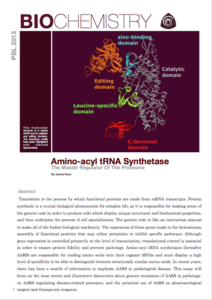Translation is the process by which functional proteins are made from mRNA transcripts. Protein synthesis is a crucial biological phenomenon for complex life, as it is responsible for making sense of the genetic code in order to produce cells which display unique structural and biochemical properties, and thus underpins the process of cell specialisation. The genetic code is like an instruction manual to make all of the cell’s biological machinery. The expression of these genes leads to the downstream assembly of functional proteins that may either potentiate or inhibit specific pathways. Although gene expression is controlled primarily at the level of transcription, translational control is essential in order to ensure protein fidelity and prevent pathology. Amino-acyl tRNA synthetases (hereafter AARS) are responsible for loading amino acids onto their cognate tRNAs and must display a high level of specificity to be able to distinguish between structurally similar amino acids. In recent years, there has been a wealth of information to implicate AARS in pathological disease. This essay will focus on the most recent and illustrative discoveries about genetic mutations of AARS in pathology, on AARS regulating disease-related processes, and the potential use of AARS as pharmacological targets and therapeutic reagents….[Click to Read More]





